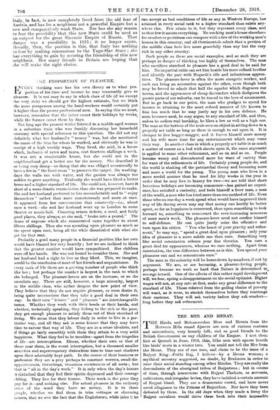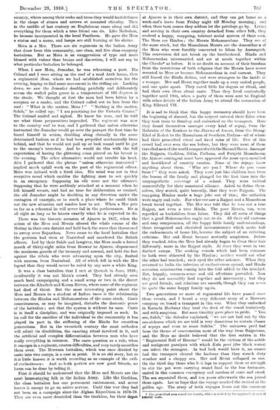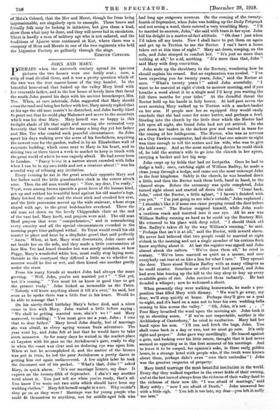THE Id:ER AND HERAT.
THDHindu and Mohammedan Mere and Merats from the Merwara. Hills round Ajmere are men of curious customs and antecedents, very homely folk, and as good friends to the British Government as any children of the Empire. I met them first at Qumah in June, 1916, thin, lithe men with sparse beards like birds' nests in a winter tree. You could not tell the Mer from the Merat. They are of one race, and claim to be the issue of a Rajput King—Prithi Raj, I believe—by a Meena woman; a mythical ancestry suggested, no doubt, by Brahmins in order to raise their social standing among other Hindus. They are really the descendants of the aboriginal tribes of Rajputana ; but in course of time, through intercourse with Rajput Thalturs, as servants, cultivators, and irregular levies, they have imbibed a certain amount of Rajput blood. They are a democratic crowd, and have never owed allegiance to the Princes of Rajasthan. Nor have they been defeated by them. In the old days when they made a foray the Rajput cavaliers would drive them back into their impossible
country, whore among their rocks and trees they would hurl defiance in the shape of stones and arrows at mounted chivalry. Then in the middle of last century an Englishman came along and did everything for them which a true friend can do. Like Nicholson, he became incorporated in the local Pantheon. He gave the Mere a status and a name, and lamps are still burning at his shrine.
Mota is a Men There are six regiment's in the Indian Army that draw from this community, one class, and five class-company battalions. But as Meta is an exaggeration of type and more blessed with valour than brains and disoretion, I will not say to what particular battalion he belonged.
When I saw Meta, Jemadar, he was rehearsing a part. His Colonel and I were sitting on the roof of a mud Arab house, then a regimental Mess, where we had established ourselves for the evening, hoping to find some movement in the stifling air. Looking down, we saw the Jemadar doubling painfully and deliberately across the walled palm grove in a temperature of 105 degrees in the shade. We thought at first the man had been bitten by a scorpion or a snake, and the Colonel called out to him from the roof : "What is the matter, Mota ? " "Nothing is the matter, Sahib," he called up; "I am praetising for the Victaria Crarse." The Colonel smiled and sighed. He knew his man, and he told me what these preparations impended. The regiment was new to the country and to war, and I gathered that unless otherwise instructed the Jemadar would go over the parapet the first time he found himself in action, doubling along clumsily in the same determined fashion as if he had been propelled mechanically from behind, and that he would not pull up or look round until he got to the enemy's trenches. And he would do this with the full expectation of having the glittering cross pinned on his breast in the evening. The other alternative would not trouble his head. Also I gathered that the phrase "unless otherwise instructed" implied much uphill work on the part of the regimental officer. Meta was imbued with a fixed idea. His mind was not in that receptive mood which enables the fighting man to act quickly in an emergency. Supposing his n5le were not the offensive. Supposing that he were suddenly attacked at a moment when he felt himself secure, and had no time for deliberation or counsel, the old Jemadar might be doubling in any direction under the contagion of example, or to reach a place where he could think out the new situation and resolve how to act. When a Mer gets as far as a rehearsal he will never fail in the perfonnanze. He is all right so long as he knows exactly what he is expected to do.
There was the historic occasion of Ajmere in 1857, when the action of the Mars and Merats altered the whole course of the Mutiny in their own district and held back the wave that threatened to sweep over Rajasthan. News came to the local battalion that the garrison had risen at Nasirabad and murdered the British officers. Led by their Sahib and lawgiver, the Mere made a forced march of thirty-eight miles from Beawar to Ajmer°, dispossessed the mutinous guards of the treasury and arsenal, and held the fort against the rebels who were advancing upon the city, flushed with mimeos, from Nasirabad. All of which fell in with the Mer legend that they would never be ruled by any save a white King.
It was a class battalion that I met at Qurnah in June, 1916; incidentally it was not Mota's crowd. They had already seen much hard campaigning and a small scrap or two in the desert between the Kharkeh and Karun Rivers, where some of the regiment had died of thirst. But the most interesting point about the Mere and Merats to a student of Indian races is the relationship between the Hindus and Mohammedans of the same stook. Caste consciousness, as may be imagined, disturbs the domestic peace of the battalion ; not that the system is without its uses. Caste is in itself a discipline, and was originally imposed as such. In its call for the sacrifice of the individual to the community it has played its part in the stiffening of the Hindu for countless generations. But in the twentieth century the most orthodox will admit its disabilities, the exacting ritual involved in it, and the artificial and complex differentiation between men who have really everything in common. The caste question as a rule, when it emerges in a regiment, creates difficulties, and very rarely smoothes them over. The Merwara battalion, which was once divided by caste into two camps, is a came in point. It is an old story, but as it is little known it is worth recording as an example of the evils of exclusivenes=. And as both parties are now good friends, no harm can be done by telling it.
First it should be understood that the Mere and Merats are the most home-staying folk in the Indian Army. Like the Gurkhas, the class battalion has one permanent cantonment, and never leaves it except to go on active service. Until this war they had not been on a campaign since the Afghan. Expedition in 1878-79. They are even more domiciled than the Gurkhas, for their depot at Ajmere is in their own district, and they can get home on a week-end's leave from Friday night till Monday morning ; and when their turn comes they seldom let the privilege go by. Living and serving in their own country detached from other folk, they evolved a happy, easygoing, tolerant social system of their own. The Mere are Hindus ; the Merate Mohammedatus. They are of the same stock, but the Mussulman Merats are the dasoendans of the Mars who were forcibly converted to Islam by Aurangzeb. This conversion did not break up the brotherhood. Hindu and Mohammedan intermarried and sat at meals together within the Chauka* as before. It is no doubt on account of their freedom from the restrictions of both religions that the Merats have never reverted to Mere or become Mohammedans in real earnest. They still feared the Hindu deities, and were strangers to the inside of a mosque. Mer and Merat together made up a very united people, and one quite apart. They oared little for dogma or ritual, and had their own ideas about caste. Thus they lived contentedly together until 1904, when a party of them were sent to England with other details of the Indian Army to attend the coronation of King Edward VII.
It is sad to think that this happy oeremony should have been the beginning of discord, but the serpent entered their Eden when they took train to Bombay and embarked on the transport. Hors they found themselves amongst every kind of sepoy, from the Mahratta of the Konkau to the Jharwa of Assam, from the Bliangi Kliel of Kohat to the Mussulman of Southern Madras—all of whom had their prescribed ritual and fixed rules of life. Few of this crowd had ever seen the sea before, but they were most of them travelled men of the world compared ait h the Merand Merat. Amongst the Rajputs, Gurkhas, Sikhs, Pathan's, and Punjabi Musauhnans the Ajmere contingent must have appeared the most open-mouthed and bewildered of country cousins. None of the sepoys know anything about them. "Who are you? Where do you come from ? " they were asked. They wore just like children torn from the bosom of the family and plunged for the first time into the unsympathetic entourage of a schooL They were twitted unmercifully for their unnatural alliance. Asked to define them- selves, they stated, quite honestly, that they were Rajputs. The easygoing Hindus made a huge joke out of this ; the orthodox were angry and rude. For whoever saw a Rajput and a Mussulman break bread together. The Mer was told that he was not a true Rajput, not even a true Hindu. The poor Marais, too, were regarded as backsliders from Islam. They did all sorts of things that a good Mohammedan ought not to do. All their old customs and easy compromises, all the happy little family understandings, those recognized and cherished inconsistencies which make half the endearments of home life, became the subject of an unfeeling criticism. Mer and Merat became mutually suspicious. Before they reached Men the Mors had already begun to dress their hair differently, more in the Rajput style. At Suez they were in twc distinct camps. The cooking vessels which had been common to both were abhorred by the Hindus ; neither would eat what the other hacl touched ; each eyed the other askance. When they returned to India the infection of exclusiveness spread, and Hindu sectarian missionaries coming into the fold added to the mischief. But, happily, common-sense and old affections prevailed. Now they do not ostensibly feed together and intermarry ; but they are good friends, and relations arc smooth, though they can neve' be quite the same happy family again.
Two generations or more of regimental life have passed since these events, and I heard a very different story of a Merwara company on board a transport in this war. When they embarked in Karachi Harbour they trod the deck of the vessel tentatively and with suspicion. But soon timidity gave place to pride. "You see, Sahib," the Subadar explained, "we are not laid out by this sea-sickness which we are told is very disastrous to certain classes of sepoys and even to some Sahibs." The unknown peril had been the theme of conversation most of the way from Rajputana, and the Mere no doubt believed that the first entries in the "Regimental Roll of Honour" would be the victims of the subtle and malignant paralysis with which Sala pani (the black water) can infect the strongest. As bad luck would have it, no sooner had the transport cleared the harbour than they struck dirty weather and a choppy Bea. Mer and Merat collapsed as one. On the third day those who hqd legs to support them or strength to stir the pot were carrying round food to the less fortunate, united in this common emergency and careless of caste and creed. The sea separated them, and ten years afterwards the sea joined them again. Let us hope that the voyage marked the revival of the golden age. The story of both voyages boars out the comment • The prescribed area round the hearth, whicn La defiled by the approach of lace of interior caste, of Mota's Colonel, that the Mer and Merat, though far from being impressionable, are singularly open to example. These brave and friendly folk may be lacking in initiative, but give them a lead, show them what may be done, and they will never fail in emulation. There is hardly a man of military age who is not enlisted, and the traditions of Ajmere were continued at Kut, where there was a company of Mere and literate in one of the two regiments who held the Liquorice Factory so gallantly through the siege.
EDMUND CANDLER.




























 Previous page
Previous page